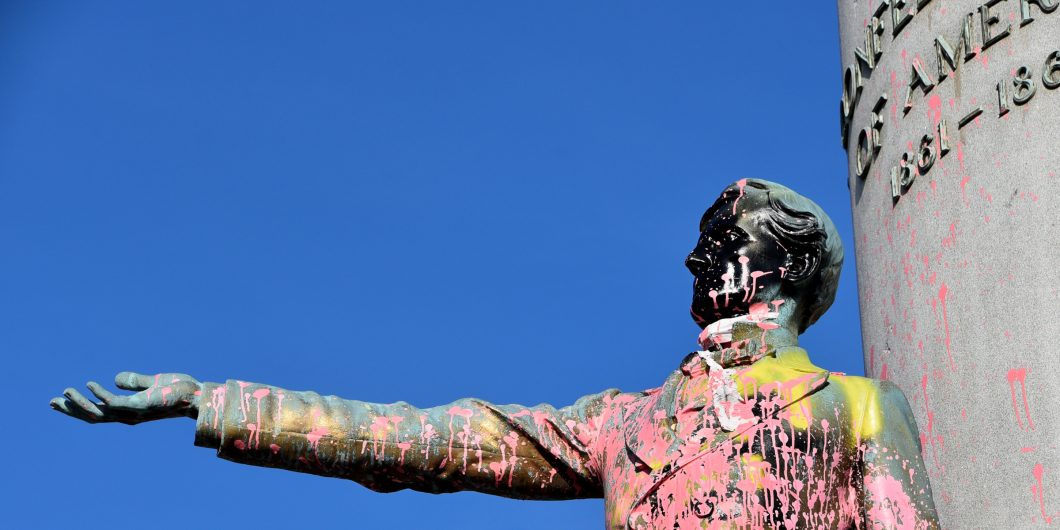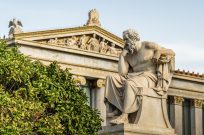Michael Oakeshott aimed to carve out a space for political education without ideology: this makes him especially vital to reread today.
Lest We Forget
Editor’s Note: This essay is part of a Law & Liberty symposium on Joshua Mitchell’s American Awakening.
Everyone interested in understanding the real scope of the challenge identity politics presents for the West should read American Awakening. Joshua Mitchell proposes that the many threads of this movement ought to be understood as a species of civic religion, carrying with it the echoes of mostly-forgotten theological longings felt by citizens yearning for liberation from the oppressive legacies of our past. Most readers will immediately appreciate his complex and powerful diagnosis of the trends in American life that got us here. The last third or so of the book steps back from looking to identity alone and offers something like a theology of history, one that portends a profoundly unsettling future.
While it seems unlikely that the nation’s Black Lives Matter protests would have erupted with so much force absent the pandemic, Mitchell explains the cultural tensions that gave birth to it in how we comprehend history itself:
The emergence of identity politics is the clockwork, predictable consequence of a civilization that has neither the courage nor the honesty to fully renounce its foundation and start over—or to fully return to that foundation for sustenance.
Mitchell proposes that while it might seem like the rise of the religiously-unaffiliated “nones” offers proof that faith is on the decline, it is more accurate to say that many Americans now practice their religion within the realm of politics. In place of a firm conception of original sin that chastens the community and forces them to attend to their transgressions, what Mitchell terms “the identity politics of innocence” offers up a shortcut: It rejects original sin but retains “original sinners,” and in doing so, identity politics, issuing in cathartic rage against white transgressors and any who would defend them in the name of the innocent oppressed.
This is what drives the adherents of identity politics to so often and so relentlessly use condemnatory language—“racist,” “sexist,” “homophobe,” and the like—where no evidence of wrongdoing is apparent. The goal is to “purge a group or humiliate its members into silence,” and this drive to identify the transgressions of the past and present with groups rather than individuals drains the very concept of transgression of all meaning, and eliminates any basis for an ethos of responsibility—to say nothing of the practices of self-government.
The Theology of Democratic History
Unsurprisingly to anyone familiar with his work, Mitchell initially frames this in Tocquevillean terms: Prior to the widespread advent of an ethic of equality, Tocqueville wrote that those who undertook the study of history could legitimately look to the actions and thoughts of a few great men, and “will unhesitantly suppose slight accidents to be the cause of the greatest revolutions.” There is a partial truth to this. But as equality spreads, “Historians who live in democratic ages are not only prone to attribute each happening to a great cause but also are led to link facts together to make a system.” Where aristocratic history promoted a strong sense of human agency, it did so in a world where ordinary people enjoyed very little liberty. In democratic times, by contrast, history itself preaches a “doctrine of fatality,” where the effects of our individual striving are understood to be nothing in comparison to the greater trends dominating our social state. The irony here is that while social and cultural historians so often seek to uncover the hidden history of the forgotten, they do so in a method that would lead those of a similar circumstance to doubt that their actions have meaning at all. Tocqueville predicted that a people educated on history of this kind would “soon paralyze the activities of modern society,” and be ripe for “mobilization” by the state, which becomes the repository of all the democratic citizen’s hopes.
What sets Mitchell’s reading of Tocqueville apart is his alertness to the religious dimension of resisting that fatality of history. American Awakening articulates his hope for a renewal of what he calls “liberal competence,” a patient re-knitting of face-to-face relationships between citizens, one ultimately only possible under the auspices of a renewed faith that allows us to find meaning in suffering, past and present.
By comprehending secular history within the broader horizon of a history of salvation, Christians can recognize the limited but real scope of human agency while also accepting and learning from mankind’s many sins. This entails neither an obsessive dwelling upon our past transgressions nor acts of forgetting. Instead, it requires forgiveness. Christians should be able to play this part because those conscious of the gift of God’s unmerited grace ought to be those most capable of seeing the necessity of extending it to our fellow citizens, past and present. For the purposes of this argument, what is most crucial is that this belief allows us to declare ourselves innocent—our many moral debts in history already paid—and cope with today’s disorders without becoming obscured by the lengthened shadows of the past.
Mitchell’s most important example of this sensibility is Rev. Martin Luther King Jr., who forced Americans to reckon with slavery’s grim, unhealed wounds—injuries still not healed sixty years after his ministry—but did so believing in our salvation and with an understanding of how the habits of slavery and mastery would take decades of patient work to undo. Consider these words from his sermon, “Remaining Awake Through a Great Revolution”:
We’re going to win our freedom because both the sacred heritage of our nation and the eternal will of the almighty God are embodied in our echoing demands. And so, however dark it is, however deep the angry feelings are, and however violent explosions are, I can still sing “We Shall Overcome.”
We shall overcome because the arc of the moral universe is long, but it bends toward justice.
We may not achieve temporal justice soon, but King reminds Christians of the certain hope that justice will indeed come.
Where once the majority of American churches drew souls into an orthodox understanding of transgression and innocence, in time they recoiled from this hard teaching. The problem is that justice remains inescapable; we hunger for satisfaction, for a person who can enter into our world and carry our guilt and shame, and lacking one, we make a new scapegoat. The progressive historical sensibility not only abandons the Christian foundation for King’s understanding of racial justice but it also leaves us unable to move forward. Those who would seek justice against the transgressors demand it here and now, in a form that American law cannot easily accept. And as Mitchell observes, when the woke look to the American past and present, “Because forgiveness has been banished, their portion is unyielding and unending rage.”
Historically, this explains the 1619 Project and its uncompromising refusal to recognize the mixture of good and evil as endemic to any nation’s founding. Mitchell’s theological view of history helps us see the entire project of progressive history as an attempt to shed the Christian history of salvation, rendering time in secular terms alone. What is peculiar is that the progressive historical vision retains the distinctive hallmark of Enlightenment moral reasoning. That is to say, it holds on to the moral flavor of Christianity while shedding its substance; it maintains the universal demand for rights and justice, but without any of the metaphysical foundation that would make sense of our suffering. It offers a historical view that seeks to undo the influence of the past’s imperfect men and women, allowing us to ignore or void all of their good works and virtues but forget none of their transgressions.
Throughout the book, Mitchell draws attention to seemingly small but deeply telling transformations in thought. Of King’s posthumous rhetorical turn from “Reverend” to “Doctor”: where the former could point to a hopeful reconciliation between citizens in neighborly love, we’re left with the current use of the latter as a secular icon whose “‘struggle with social injustice’ gives us merely mortal and unredeemable transgressors, innocents whose rage must never cease, and a plan to harness the despair of both parties.”
But where does this end? Mitchell offers some hints.
The Refusal of History
Where believers can still adopt a redemptive view of history, contemporary polemics often reject this and present the alternatives between understanding American history as either “patriotic” or “critical.” But this rhetorical competition between a history of American greatness and a history of American transgression obscures a third alternative, one that was only hesitantly embraced in the past, mostly by partisans of progress or equality, and even then beset by self-contradiction—one centered on a kind of forward-looking amnesia.
The final task of those who would transcend the Christian inheritance is to destroy identity politics altogether—to restore an honestly cruel aristocratic sensibility, a world where “strength is strength” and weakness is despised.
In a brief exposition of Kant, Hegel, and Marx late in the book, Mitchell observes:
They retained just enough of the Christian spirit of suffering to invent redemptive histories that bathe men in blood, and demanded that he endure suffering for millennia with nothing to show for it except a distant promise that he would never live to see.
By contrast, consider John Rawls, whose Theory of Justice “is premised on our American intuition that we can build a just political community with citizens who have no history.” Indeed, one might say that the success of his entire moral theory depends on citizens who have forgotten the transgressions of the past and the traditions of their fathers, and as a result, are people who can look solely to what political and economic arrangements will best defend equality and their freedom. Rawls’ intuition also follows from the notion that the “patient suffering of innocents has no redemptive value” (emphasis in original). But where this effort and those like it overcame that last vestige of Christian thought, Mitchell asks whether the last step of down this line of reasoning will simply be to “put an end to the relationship between transgression and innocence altogether?”
In advocating a fearful world where putative innocents devour transgressor groups, Mitchell implies that identity politics unwittingly prepares the way for a resurgence of fully pagan thought. Completely unmoored from redemptive history, this view would erase the burden of history in a mixture of indifference, violence, and forgetting. If it were achieved—or perhaps I should say, if it is actually achievable—this would fulfill Friedrich Nietzsche’s yearning for a world that finally transcends what he saw as the resentful poison of Jewish and Christian faith.
In Ecce Homo, Nietzsche wrote that
when truth comes into conflict with the lies of millennia there will be tremors… The concept of politics will have then merged entirely into a war of spirits, all power structures from the old society will have exploded—they are all based on lies: there will be wars such as the earth has never seen. Starting with me, the earth will know great politics.
We are not there yet, as Mitchell notes that most conservative and reactionary “transgressors” today shrug off the inherited sins of our history—but do so as an argument in self-defense. They “remain captive to the relationship between transgression and innocence,” and instead live in much the same way the old Southerner did in relation to the Church: standing with one foot inside and the rest of their life without.
The Final Revolution?
The final task of those who would transcend the Christian inheritance is to destroy identity politics altogether—to restore an honestly cruel aristocratic sensibility, a world where “strength is strength” and weakness is despised. To our great good fortune, most on the Alt-Right today cannot bring themselves to make this last break from the old moral world. Those that desire this find membership in small pagan communities and live as castaways or outlaws. But in a nation where we hardly learn our history—where what is taught is merely factual or ideological—and where even hints of Christian teaching tend to be rejected, the prospect of forgetting our transgressions entirely might grow more plausible.
In his 1977 novel Lancelot, Walker Percy offered a picture of this in the voice of Lance Lamar, a would-be new man waiting patiently for his release from the asylum and prophesying an age to come:
We know who we are and where we stand. There will be leaders and there will be followers…. There will be men who are strong and pure of heart, not for Christ’s sake but for their own sake. There will be virtuous women who are proud of their virtue and there will be women of the street…. You will do right, not because of Jew-Christian commandments but because we say it is right. There will be honorable men and there will be thieves, just as now, but the difference is one will know which is which and there will be no confusion, not nice thieves, no honorable Mafia. There are not many of us but since we are ready to die and no one else is, we shall prevail.
The fact the many recent protests have not ended in mass slaughter suggests that few or none of the transgressive Alt-Right have reached this point. Their unwillingness to embrace the logic of the cruel noble—Nietzsche’s unchained beast of prey—is fortunate. We might legitimately ask: for how long will this restraint last?
While Mitchell does not directly discuss the allure of Carl Schmitt in conservative circles, I wonder whether his resurgence in recent years does not owe something to this longing for moral clarity and freedom from the burden of the past. The desire to “restore” politics to the relation between friends and enemies may offer a field where Lancelot’s prophecy makes its way into reality. The partisans of identity politics invite just such a distinction, as their demand for scapegoats inevitably creates new ones. This may yet issue in an escalating spiral of civic unrest and destruction—which some will ultimately resist with even greater violence.
The Left cannot quite bring themselves to abandon morality, and so their deployment of Schmittian friend-and-enemy logic remains in service of expunging the scapegoat. In “America’s Two Souls,” Ibram X. Kendi locates all of America’s evil in the transgressive “soul of injustice” and writes on behalf of the long-oppressed “soul of justice”:
There’s no saving America’s soul. There’s no restoring the soul. There’s no fighting for the soul of America. There’s no uniting the souls of America. There is only fighting off the other soul of America.
Manichean and Schmittian though his logic may be, Kendi retains the essentially moral yearning for redemption. He seeks it in the political destruction of the transgressor, and not in the church. Such striving after collective innocence can only lead to a dead end. It also portends the literal end of the republic, as self-government requires citizens who acknowledge their individual weakness and immorality, and yet come together to patiently build a common life, responsible for their own mistakes and injustices, and willing to forgive each other as they have been forgiven of so much.
Mitchell calls us to answer a fateful question:
What, we must ask, is the greater danger: the Christian invitation to attend firmly to our own transgressions, in the knowledge that there is no earthly remedy for them; or is it the Nietzschean Alt-Right demand that we cease to take our transgressions seriously? How, we must ask, is a tomorrow more possible—through mysterious Divine transference or through forgetting?
While we ponder this, Mitchell has left us a powerful account of the stakes we face. America cannot be managed out of this moral crisis, nor can we mend our broken civic life through the ephemeral bonds of social media. Rather, we must strive to rebuild our competence in what is most essential to living well, and strive to offer forgiveness and love to our neighbors. This will requires us to muster ordinary acts of stewardship and hard labor in unfavorable circumstances, but what else is there?



